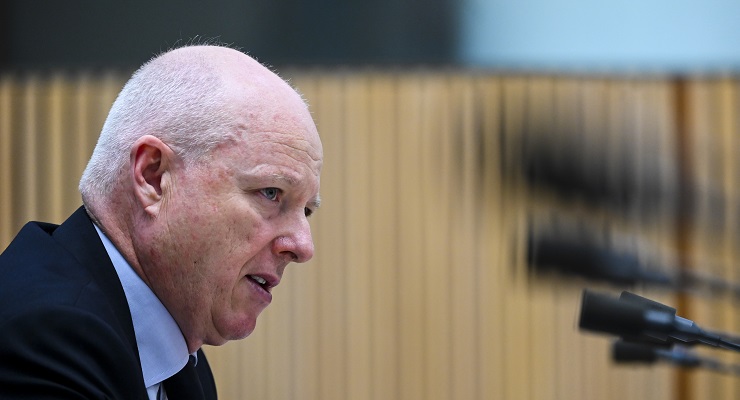
The old saying warns that when you are in a hole, stop digging. It’s a lesson that seems to have eluded the Bureau of Meteorology.
Under attack on all sides because of its communication failure over a “rebrand that wasn’t”, the bureau decided to post a statement that would supposedly address “a number of inaccurate statements” made about the organisation.
Unfortunately the statement failed to identify — let alone address — any such inaccuracies.
Every PR student learns that a well-written statement can be a powerful communication tool for any organisation, especially under the pressure of a reputational crisis (I know this because I have taught corporate writing at both undergraduate and master’s levels).
However, the bureau’s statement seems to ignore the most basic PR 101 rules of effective communication. And it even appears to be test-driving another attempt at branding (more on that later).
To be fair, the statement shows every indication of being written by a committee and approved at the highest level. But that is no excuse.
Lesson 1: The headline should be informative and make you want to read on. What was the inviting headline on the Bureau’s statement? “Statement from the Bureau of Meteorology.”
Lesson 2: The opening should grab the reader and get right to the heart of the subject. What was the opening of the bureau’s statement? “The Bureau of Meteorology is Australia’s most trusted source of reliable and responsive weather forecasts. Our focus is always on supporting the safety, security and prosperity of the Australian community.” Sounds more like a mission statement than the response to widespread claims of a toxic corporate culture.
Lesson 3: Every major organisational statement should be issued by a named senior executive, speaking with authority on behalf of the organisation. The bureau’s statement was entirely anonymous.
Lesson 4: Have at least one key message that deals with the issue at hand. The statement said it would address inaccurate statements made about the Bureau, but didn’t. Instead, it spent more than 700 words boastfully defending the bureau’s record in providing accurate forecasts and warnings, which has never been seriously questioned.
Lesson 5: Be credible and transparent. The statement conceded: “Like any large organisation, there are times when we don’t get it right.” Which is true. But it’s not helpful if you don’t admit your mistakes and explain what you will do to put them right.
Lesson 6: Having backflipped on rebranding, don’t make a half-hearted attempt to try again. For anyone who struggled through the 700 words, the final paragraph said: “Our focus remains clear, to provide trusted, reliable and responsive weather, water, climate, ocean and space weather services for Australia — all day, every day. This is the Bureau Way.” The Bureau Way? Is that a new motivational slogan?
Of course, it’s easy to pick apart a poorly written and unfocused statement, but the underlying issue is much more important.
Serious questions have been publicly raised about the Bureau’s work culture and its communication capability, and they needed to be owned and properly addressed by a named senior executive, preferably the CEO.
Unfortunately, the Bureau’s online response failed to address the questions, and the issue of a reportedly toxic culture was simply brushed aside with a brief denial.
Similarly, when the Bureau’s CEO Andrew Johnson appeared at Senate estimates on Friday, the legitimate reports of a toxic work culture were not even raised by members of Parliament.
Presumably the CEO will think he performed well, and nothing will change.
The public and hard-working staff at the Bureau deserve better.








There is a pattern emerging – organisations which are full of highly educated scientists and which are in the business of advancing and disseminating knowledge have been captured by a parasitic stratum of managerialists who put more emphasis on confected KPIs and spin-doctoring to justify their inflated remuneration rather than on maintaining the core public-interest mission of the organisation. It has happened in BoM and the CSIRO under neo-liberal governments, judging by the current Queensland DNA lab inquiry it may have happened there too. And it has been happening in our universities for over a couple of decades already.
Not just emerging. It’s a pattern that’s been obvious since the 1980s and much commented on, but which has progressed anyway, to the ruin of many organisations, most obviously those that would in better times serve the public interest. Health and education are obvious victims, but it goes much wider. Some refer to the phenomenon as “managerialism”. The rise of the notorious MBA qualification played a significant part, giving the appearance that there is some sort of science or empirical system underlying all the cant and mumbo-jumbo. It all helped to create a belief that managing is a role of and for itself, independent of what was being managed, and that the skills of a manager are transferable to any organisation. In effect managers are the modern equivalent of the priest class in the ancient world, and they reward themselves for conducting their meaningless rituals with vast salaries unrelated to any contribution they make.
‘The skills of a manager are transferable to any organisation’. This is the essence of the problem. You can’t manage something if you do not know at least roughly how things work and the context. Otherwise the manager can be fed any BS by people internally and externally and does not have the capacity to evaluate it.
The content free manager who thinks they can go it alone is a disaster. This is the senior manager as controller. It is also all too familiar in the public services in Australia.
Someone who is a good manager but unfamiliar with an area can make it work if they take advice from experts and carefully delegate decision making to those who understand their area/work and also have the manager’s trust as knowing what the organisation aims to do. This is the senior manager as facilitator of experts.
Doesn’t. MBA stand for Means Bugger All ?
There also seems to be an issue around the BOM’s management having an eye to the former government’s CC denialism if reports are to be believed. Sounds a lot like the former ABC Chair who was keener on pleasing the government than the ABC’s charter due to budgetary fears.
The inherent communication style of managerialism is tuned for propaganda and distraction.
As such, the recent ‘thought leadership’ from the BoM is the sort of nonsense which is becoming increasingly unremarkable these days.
Most organisations would benefit from less useless management and more people actually engaged in productive activity.
Why is this happening?
Is it a reflection on CEO Andrew Johnson’s competency?
Or is he or the BOM or some 3rd party pursuing a hidden agenda?
Ooh, yes, conspiracy now!
This all sounds very much like my experience of a large organisation being run by a group of people just not skilled enough to get the job done.
Very disturbing that Estimates hasn’t sought to address the toxic culture. And, then there’s the question over the Act’s relevance to a CC emergency.
More background info re the Director and the organisation. I remember some years ago some anti climate change people were questioning the legitimacy of some temperature and rainfall statistics. Are the anti science people getting the upper hand?
5 Sep 2016
https://media.bom.gov.au/releases/282/dr-andrew-johnson-appointed-as-director-of-meteorology
Minister for the Environment and Energy the Hon Josh Frydenberg MP today announced Dr Andrew Johnson as the new Director of Meteorology.
Dr Johnson will be commencing work with the Bureau on 6 September 2016.
Biography
Dr Andrew Johnson is an internationally recognised leader, manager and scientist. Since September 2015 he has been the Principal of Johnson & Associates Consulting, a firm providing environmental and agricultural knowledge services to a diverse range of clients in the private and public sectors both nationally and internationally.
For nearly a decade Dr Johnson was a member of the CSIRO Executive Team where he led the organisation’s water, land, atmospheric, marine, biodiversity and urban research. Whilst at CSIRO he also led their Indigenous engagement agenda. For two years he was CSIRO Executive Director of Strategic Change Programs with responsibility for implementing shared services for CSIRO’s IT, Finance and HR functions as well as implementing the SAP enterprise resource planning system.
Since 2012, Dr Johnson has been a member of the Australian Government’s Independent Expert Scientific Committee on Coal Seam Gas and Large Coal Mining Development (IESC). He was appointed Chair of the IESC in 2015. He is a Non-Executive Director of the Planet Ark Environmental Foundation, a Councillor of the Queensland Futures Institute and a member of the Scientific Advisory Board of the Australian Agricultural Company. He is a former Non-Executive Director of the Rural Industries Research and Development Corporation, Reef and Rainforest Research Pty Ltd and CSIRO Chile, where he was Deputy Chairman and Vice President.
Dr Johnson has served on the Governing Council of the world-renowned International Institute of Applied Systems Analysis in Vienna and as a member International Scientific Advisory Committee of the Great Barrier Reef Foundation. He has also Chaired the Expert Advisory Council for the Northern Australia Ministerial Forum, been a member of the Prime Ministers Northern Australia Land and Water Task Force, a Governor of the Western Australia Marine Science Institution, Co-Chaired an Australian Government review of environmental performance matters in the Port of Gladstone, Co-Chaired the Supervisory Committee of the Australian Centre for Weather and Climate Research and served as a member of the Reef 2050 Advisory Committee.
Dr Johnson has a Bachelor of Agricultural Science (Honours) and PhD from the University of Queensland and a Masters in Public Administration from the John F Kennedy School of Government at Harvard University where he was a Rotary Foundation Scholar. He is a Fellow of the Australian Academy of Technical Sciences and Engineering and the Australian Institute of Company Directors.
With the change of government, there would have been a terrific shift in internal tensions in the BOM. Up until recently they were under pressure to underplay climatic shifts, or highlight them at their own peril. Denialists would have felt more office power then than they do now, and the more responsible of the climate wise would now feel more able to warn the public of the trends. Yes, they want to change the way that BOM communicates.